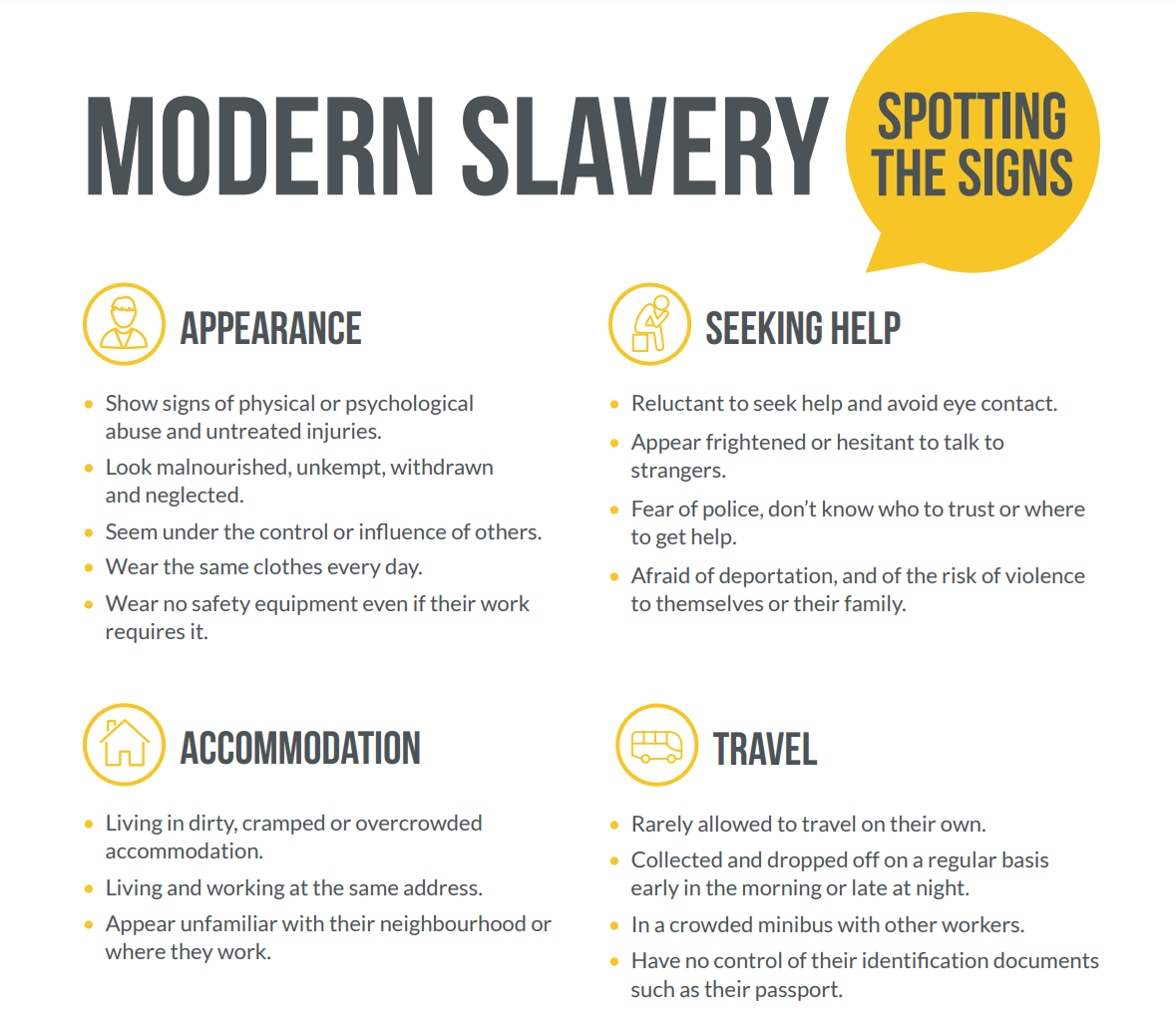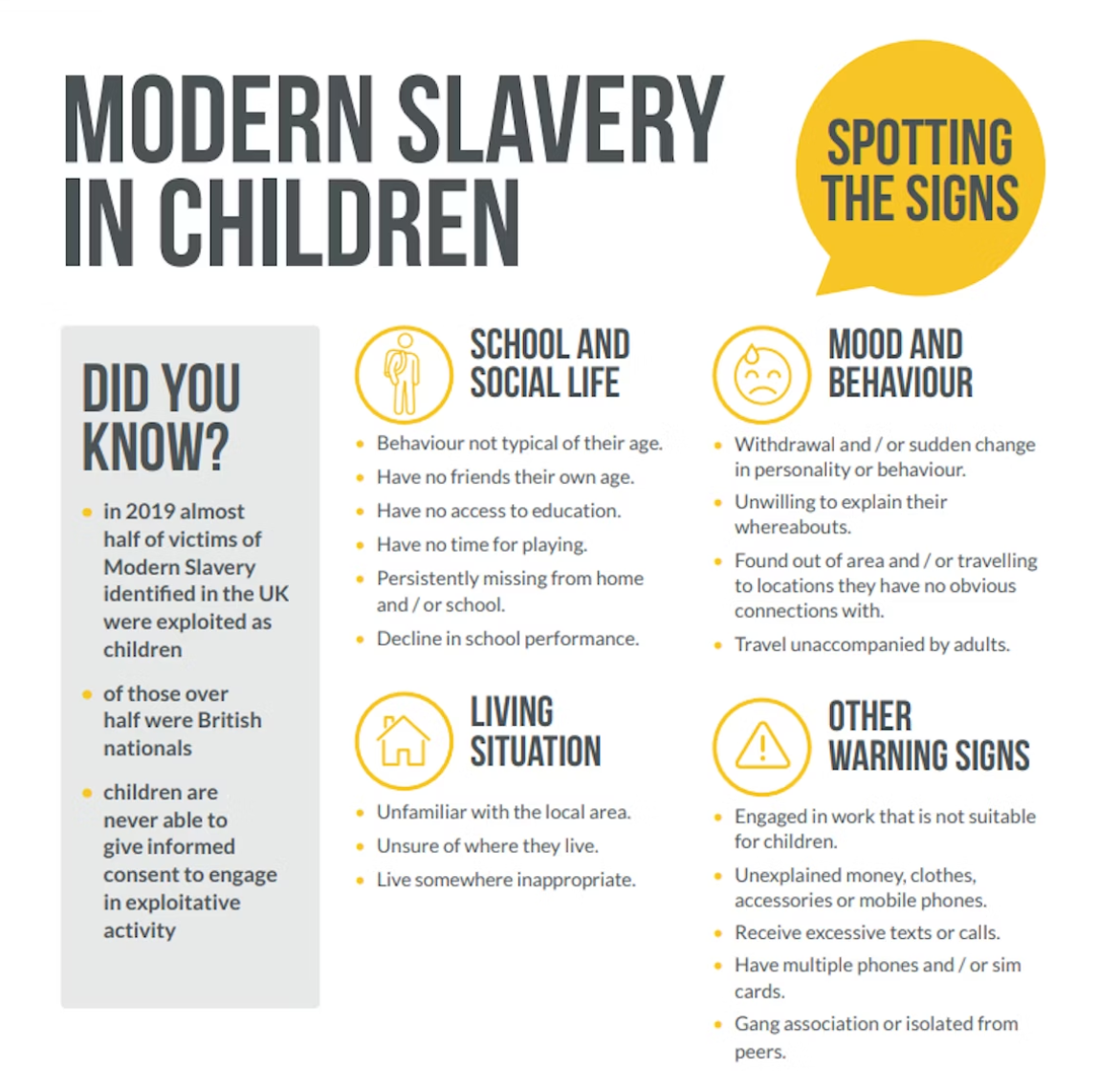Modern Slavery and county lines
Modern Slavery
Modern slavery is a crime. It is present in every single community in the UK.
In 2023, in the UK, there were over 122,000 men, women & children trapped in modern slavery.
What makes people vulnerable to exploitation?
Victims of modern slavery come from all different backgrounds and can be any age or gender. Whether British or from abroad, there is usually a 'vulnerability' that exploiters use to target them. These could include:
-
homelessness
-
immigration status and/or language difficulties
-
drug or alcohol dependency
-
a difficult family background
-
mental health problems
-
childhood/under 18s
-
geographic instability
They are often 'recruited' in person although increasingly, particularly in the sex industry or county lines drug trafficking, they may also be drawn in through social media or online job adverts. The core of this crime is deception with victims often targeted, coerced or deceived - not realising they are being controlled and exploited.
CAN YOU SPOT THE SIGNS?


What is county lines?
‘The criminal gangs operating in England are complex and ruthless organisations, using sophisticated techniques to groom children and chilling levels of violence to keep them compliant. They prey upon marginalised children who have often been let down by multiple agencies. Many of these children don’t feel that they have any choice about their situation’.
Anne Longfield, Children’s Commissioner
February 2019
County lines involves the supply of illegal drugs from large urban areas to smaller cities, towns and provincial locations using dedicated mobile phones, known as deal lines, to take orders. Offenders frequently target children and vulnerable adults to facilitate such criminality - manipulating and coercing them into drug trafficking and distribution. Young women are sometimes specifically targeted for recruitment into exploitation in county lines because they less are likely to attract suspicion from law enforcement.
Victims coerced into county lines are often surrounded by threats and violence, be it from their exploiters or rival gangs. Women and girls can also be subject to sexual violence and blackmail, with offenders sometimes using indecent images as a means of control. As a result of this control and fear, victims are likely to avoid telling others about the reality of their situation.
Demand for drugs has continued throughout the COVID-19 pandemic, meaning children and vulnerable adults continue to be coerced into distribution models, despite school closures altering the places in which victims are identified and recruited. Social media remains a key enabler in this, with vulnerable persons identified and offered opportunities to earn money rapidly.
County lines gangs are organised criminal networks who are constantly refining their operations to avoid detection resulting in the signs of exploitation changing and becoming increasingly subtle. They may, for example:
-
target victims who do not fit existing stereotypes such as young people from more affluent backgrounds and girls, who are less likely to be picked up by the police
-
use platforms such as Snapchat, Instagram and TikTok to target victims.
-
use holiday accommodation, including airbnbs, caravans and hotels, as a base for their operations so that they are more difficult to detect.
-
County lines can also involve cuckooing, where dealers take over a local property, usually belonging to a vulnerable person, to use as a base for their criminal activity.
As with other forms of exploitation, people exploited in this way often don't report what is happening - sometimes due to fear or shame and sometimes because they don't see themselves as victims.
Why and how do children and young people get drawn into county lines?
It's important to understand that the criminals behind county lines are ruthless but organised gangs. They use sophisticated techniques to coerce children and shocking levels of violence to keep them compliant.
Targeted
In broad terms, young people are targeted and chosen - the exploiter usually seeks out those that are marginalised and vulnerable.
They will look for things like age, vulnerability, situation and characteristics that may help them go unnoticed.
They will observe their chosen victim to understand their vulnerabilities, needs and wants and then work to gain and build the young person's trust.
Coerced
Coercion may involved glamorising their lifestyle while developing the young person's trust by including them and making them feel wanted and protected. Often, a gang member will befriend the young person, buying them gifts like branded clothing and trainers, mobile phones and food. They will spend a lot of time making them feel special - as much as is needed to build trust. The young person will gradually be drawn into their lifestyle, introduced to other members of the gang and trained up in what they are doing.
Hooked and trapped
The young person will begin to feel a sense of belonging - as though they are a member of the gang with a sense of identity within the group, possibly being given more responsibility and a bigger role - which can become dependence. But ultimately, their treatment at the hands of their exploiters usually starts to become unpleasant for example with threatening behaviour, blackmail, violence and sexual assaults. A common tactic involves staging a mugging. The victim will be entrusted with something of value - they will then be mugged, losing the item. The gang member will get angry, possibly violent, and insist they need to pay back the value of the item, and give them packages to deliver.
Physical and mental abuse are common along with threats of violence or death to their family members if they try to leave the gang. Despite this child victims may not even realise that they are being exploited. They may believe that the members of the gang are their friends and that they are being looked after.
AS WITH ALL CRIMES, IT IS IMPORTANT TO REPORT ANY SUSPICIONS YOU MAY HAVE ABOUT MODERN SLAVERY TO THE POLICE. Do not attempt to intervene yourself - you may put yourself and others in danger, including the potential victim.
HELPLINES
If a child is in immediate danger call 999
If it is not an emergency call 101 or call Crimestoppers on 0800 555 111
Modern Slavery & Exploitation helpline: 08000 121 700
NSPCC helpline: 0808 800 5000